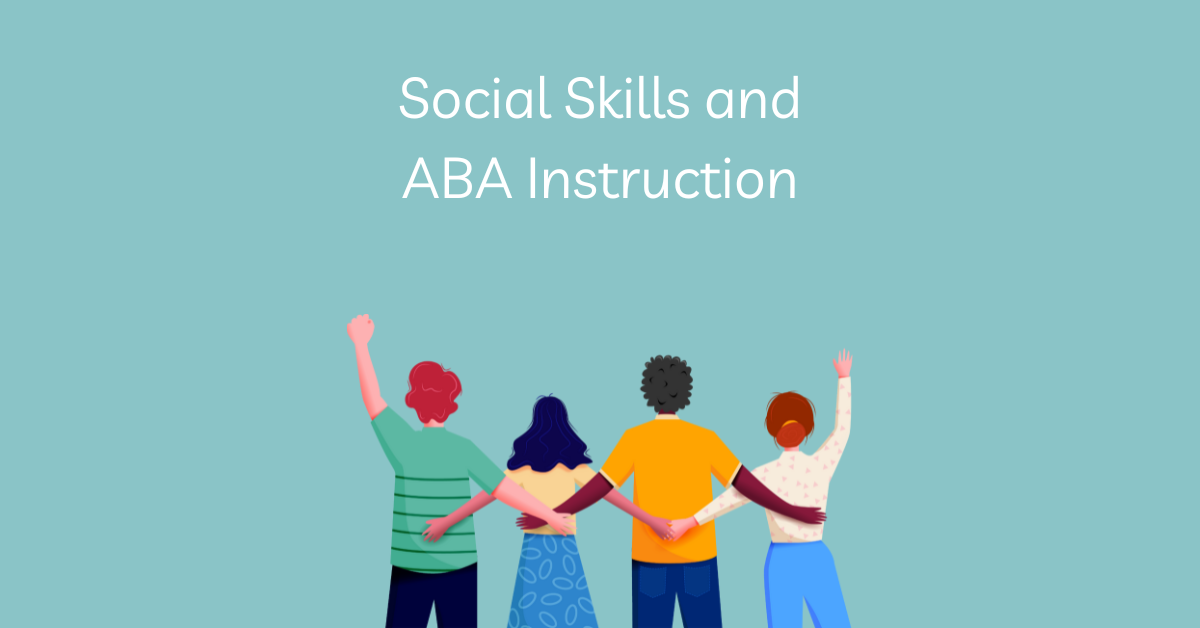Jenna Zatz
Incorporating social skills in special education settings is essential for creating an equitable and well-rounded environment. It teaches students how to communicate, socialize, and advocate for themselves. However, social skills are often overlooked and neglected in instruction — especially in classrooms that are centered around ABA, such as self-contained or autism classrooms. Fortunately, there’s a seamless method to integrate social skills instruction into classrooms while grounding instruction in ABA principles and practices.
Let’s start with the basics: what are social skills?
Put simply, social skills are the skills we use to communicate with one another, through gestures, body language, appearance, and verbalized language, among others.. Within this broader definition includes specific functions, such as syntax, body language, social cues, code-switching (adjusting behavior according to who you are with), conversation-starting, maintaining, and knowing when to end a conversation, just to name a few. When equipped with appropriate social skills, we can more successfully function around other individuals, whether one-on-one or in a group of people.
What is ABA-centered instruction?
ABA stands for applied behavior analysis. ABA is a scientific and quite technical field of psychology that provides guiding principles for instruction. Most commonly, ABA is known for its success in modifying behaviors through understanding the function of behaviors, manipulating the environment, and providing reinforcement to increase positive behaviors. However, ABA is also a field that develops specific procedures, protocols, and strategies for students to acquire new skills — including social skills.
Why should I intentionally and directly teach social skills?
The traditional goal of education is to prepare students for the world outside of the classroom, and in the real world, communication is key to any sort of interpersonal interaction. It is inevitable that your students will find themselves in situations that involve communicating with other individuals, whether it is through words, body language, maintaining and respecting personal space, and advocating for themselves. Teaching them how to communicate using social skills gives them another tool to engage with the world beyond the classroom doors.
However, for many students, social skills are not acquired naturally. And when social skills are excluded from the curriculum, students often find themselves at a disadvantage. It can create inequitable environments inside and outside of the classroom. For example, group work can become challenging for students who lack social skills in the areas of personal space, turn-taking, and staying on task. Similarly, students that lack social skills may face isolation during recess due to difficulties with turn-taking, understanding social norms, unexpected changes, and losing games without a potential meltdown.
Shifting to the bigger picture, direct instruction of social skills creates a fair playing field when students are at employment age and must undergo interviews, break room conversations, and interact with coworkers. It offers a check and balance system to any inequities that might result from lacking social skills and sets students up for success.
Why are social skills neglected?
It is never intentional for social skills instruction to fall by the wayside. Oftentimes, ABA classrooms are focused on behavior modification, skill acquisition, and increasing independence in other areas. All are valid and necessary skills, but without social skills, the student is left with incomplete instruction.
With that said, many misconceptions have led teachers to a negative impression about social skills instruction. For example, it is largely believed that social skills needs to have its own period or block amongst a day full of other tasks and/or should only be taught in whole group settings. Another misconception is that social skills cannot be taught using traditional ABA methods.
However, this is not the case! Successful instruction includes methods ABA experts are familiar with, like chaining, reinforcement, and natural environment teaching. Teachers are without a doubt masters of multitasking — and these are simple ways to integrate social skills into your primary instruction throughout the day.
How do I fluidly integrate social skills instruction throughout the day?
Social skills can be taught using the same methods used in discrete trial instruction, direct instruction, and natural environment teaching. A few ideas include integrating a conversation during a morning meeting, setting aside time for playing a game, initiating a class discussion that might yield some differing opinions, and offering problem-solving activities.
The most important aspect of successful integration is providing time for students to practice the skills you teach. As you build in social skills instruction, helpful strategies include providing specific reinforcement that praises the students’ exact appropriate interactions. You can show videos that model and demonstrate appropriate social skills via YouTube and/or record some with model peers.
You can also provide structured opportunities to interact with model peers, using the model peers as mentors who can help students practice acceptable social skills. For example, during a physical education class, students would introduce themselves to one another before starting an activity and model peers would guide good sportsmanship, turn-taking, and other necessary social skills.
As you think about your own classroom routine, ask yourself:
- Am I providing opportunities for social engagement among peers?
- Am I modeling appropriate social behavior?
- Am I providing feedback and reinforcement to increase social behavior?
Building in social skills instruction doesn’t have to be a complex process. And the end result leads to students who are more equipped for the challenges of a complex world reliant on variants on interpersonal communication. In this way, we’re doing our part to reduce inequities and give our students the best chance at success in the “real world” — which is ultimately our goal as educators!
If you are interested in implementing more social skills instruction, the Magnolia Consulting Group is here to help! We have the expertise to guide you through the process and ensure that your program is following the guiding principles of social skills instruction in ABA. Our resources and technology can help provide the necessary support for students receiving instruction to be successful. Contact us at [email protected] to get started!


